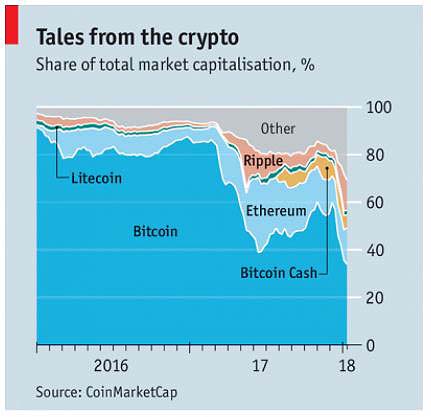Everything I read says the GE mess with its popup losses is way beyond anything new management expected and really hard to solve. I don’t hear a plan. I don’t think they have one. In short, they’re floundering. I’m out.
GE was a semi-expensive lesson. Pulling the trigger fast often works. Hope doesn’t. Hanging around through the agony is not good on the soul.
FANG is ebbing. FANG sentiment is waning. Take a little off the table. It’s been a nice run.
State of my Venture Capital
+ Don’t get fat, old and check out of life. “Old” is a state of mind. I see “old” on the faces of many Coachella Valley (California) residents. They fulfill the local quip. The Valley is “God’s Waiting Room.”
+ Don’t hurry and fall. One fall above age 65 and you’re done.
+ Watch for the final step, going down.
+ Don’t lift your bag into the overhead bin. That’s why God invented millennials.
+ Run from people who are coughing. If you catch pneumonia, it may take you eight hours to check into your local hospital, get attended to and be given some strong antibiotics. Hospitals today seem to be overwhelmed and lag in new beds and new doctors. (I have too many stories.)
+ Don’t get upset at the small things. Every day there are minor irritations. Blow them off quickly. Move onto the happinessesses — the many things that go right. Like you’re still alive.
Bitcoin is no longer the only game in crypto-currency town
Which could be the next digital coin to rule them all?
A new crypto-currency is born almost daily, often through an “initial coin offering” (ICO), a form of online crowdfunding. CoinMarketCap, a website, lists about 1,400 digital coins or tokens, including PutinCoin, Sexcoin and InsaneCoin (worth $7m). Most are no more than curiosities, but by January 10th, around 40 had a market capitalisation of more than $1bn.
First on the list, after bitcoin, was Ethereum, whose coin, called ether, reached a market capitalisation of $137bn. Ethereum’s claim to fame is that it is also a platform for “smart contracts”-business rules encapsulated in software. Most ICO tokens, for instance, are issued by such contracts. Its success has attracted crypto-copycats: Cardano ($20bn) and NEO ($8bn), a Chinese version.

Ripple, too, is defying gravity. It is all the rage in crypto-crazy South Korea, which this week roiled crypto-markets with plans to ban trading on exchanges. Ripple sells software to move money between countries; more than 100 banks have signed up to its technology, based on a coin called XRP. Its market capitalisation jumped by more than 40,000% in 2017, reaching nearly $149bn on January 4th, before falling back to $78bn. That still makes Chris Larsen, a Ripple co-founder, one of the world’s richest people, at least on digital paper.Less well-known coins have also taken wing. Monero ($6bn) and Zcash ($2bn) focus on privacy. Stellar ($9.8bn) has developed a system to transfer funds cheaply that is used by charities, particularly in poor countries. IOTA ($10.1bn) allows connected machines to exchange information and payments securely. And then there is Bitcoin Cash ($46bn), whose founders split from bitcoin in August 2017 because they were unhappy with how it was run.
Might any of these one day replace bitcoin as crypto-land reserve currency, something insiders call the “flippening”? Given bitcoin’s governance problems (another “fork”, or split, may be in the offing) and limited capacity (a transaction now costs nearly $30, on average, in fees), this cannot be excluded. But the others have problems, too. Ethereum’s user fees have soared and the system has again hit technical snags. As for Ripple, some question the extent to which XRPs are actually used.
Come what may, the field will only get more crowded. Kodak, the archetypal victim of digital disruption, wants to jump on the crypto-wagon: on January 9th it announced that it will launch a coin to allow photographers to charge for their works. More ambitious will be the ICO of Telegram, a messaging service with 180m users: it aims to raise $1.2bn and issue a token called Gram that can be used to pay for a range of services from online storage to virtual private networks. Even Facebook has reportedly started looking into creating a token. Should the world’s biggest social network ever make that move, bitcoin’s days as the leading crypto-currency would almost certainly be numbered.

Harry Newton, who’s going to play tennis shortly. Take it easy. Don’t overdo it. Put on lots of suntan cream — specially on your ears. This is meant to be a daily blog, but sometimes I have nothing to say. Can you believe that?
Harry…there has never been a time when you had nothing to say (: